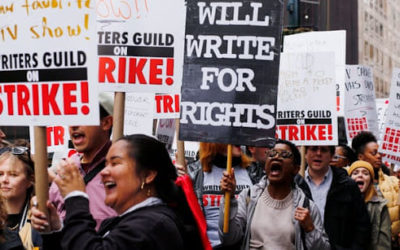Source: Deadline
Earlier this month, it had been announced that two highly anticipated upcoming cinematic releases – James Mangold’s “Indiana Jones and the Dial of Destiny” and Martin Scorsese’s “Killers of the Flower Moon” – would be screened at the upcoming Cannes Film Festival, which is currently set to take place this year in Cannes, France between May 16th and May 27th. The inclusion of both implies that these are films of great artistic merit, yet neither is expected to compete in any of the festival’s major competitions. This makes given that most festival juries are inclined to give their prizes to cinematic works that do not have the involvement of major studios and filmmakers (“Indiana Jones” is the fifth in the long-running action-adventure series spearheaded by Steven Spielberg, while “Killers” has the backing of both Apple TV+ and Paramount Pictures), films that were made by either up-and-coming or lesser known filmmakers that do not have the international recognition of their Hollywood peers. In fact, one section of the upcoming 76th Cannes Film Festival, the Cannes Critics’ Week (this year holding its 62nd annual event), is specifically designed to showcase films that are the creations of mostly filmmaking newcomers. With the oversight of the French Syndicate of Cinema Critics, this year’s Cannes Critics’ Week will hold screenings for eleven feature films, seven of which will be in competition and four of which are special screenings, as well as a solid handful of short films. All of these cinematic works are either the first or second films created by their respective filmmakers, reinforcing the efforts of the Cannes Critics’ Week to focus on those who are new to the world of filmmaking. Currently planned to be screened between May 18th and May 25th, all of the films selected here (those chosen in favor of over a thousand submitted features) will no doubt make an impression, but there are some that have been quicker to grab the attention of festival-goers and those who pay close enough attention to such events. Here is just a small sampling of the films that could end up breaking out from this year’s Critics’ Weeks line-up:
“Power Alley (Levante)” – from Brazilian director Lillah Halla (whose 2020 short “Macara” was part of that year’s Cannes Critics’ Week line-up) comes this feature-length drama, one of the eleven films in Competition this year, revolving around a young volleyball player who, upon discovering she is pregnant, finds herself going up against the nation’s abortion ban as she seeks to undergo a procedure that has been illegalized by the Brazilian government. Praised by Critics’ Week artistic director Ava Cahen for how it “opposes the conservatism gnawing at [Lillah Halla’s] country with a queer and rallying vision”, the film’s themes undoubtedly hold great weight to people who face these exact same issues no matter where in the world they live, giving the film an edge that many of the other competing films may not have.
“Sleep (Jam)” – from South Korea and director Jason Yu, who had previously served as an assistant for Academy Award winning director Bong Joon-ho, this film stars Lee Sun-kyun of “Parasite” fame and Jung Yu-mi, who had previously acted in “Train to Busan” as a newlywed couple that are increasingly terrorized by the husband’s unusual sleeping habits and the horrific events that come about from them.“Three chapters, two protagonists, a baby crying, a dog barking and a lurking phantom are the ingredients for a perfect horror comedy with a demonic efficiency,” Cahen remarked in describing the film. If her words.are accurate to how the film plays out, then there will no doubt be plenty of laughs and scares to be found in this intriguing mix of two genres with very different intentions, yet play out using similar cinematic techniques.
“Tiger Stripes” – yet another work of horror to be featured in this year’s event, this Malaysian film from director Amanda Eu delves deep into the folklore of Southeast Asia as it depicts a twelve-year-old girl starting to undergo puberty and change at a disturbingly fast rate. Though she initially attempts to hide her changing appearance from the outer world, she ultimately decides to no longer stay in hiding, leading to a series of strange events that further reflect the need for teenage rebellion in a society that may not be encouraging to the average teenage girl. Comparisons to Pixar’s “Turning Red” may come to mind for some viewers, but Cahen seems confident that the film will stand out on its own, claiming that “this fantasy film celebrates young girls’ desire for freedom and to have fun, in a society that tries hard to impose discipline.”
“La Ravissement” – this French psychological thriller from director Iris Kaltenbäck features quite a few notable names among its cast, many of whom have already made noteworthy appearances in recent works of French cinema. These include Alexis Manenti (“Les Misérables”), Nina Meurisse (“Camille”, “Petite Maman”) and Younès Boucif (Standing Up), though it’s Hafsia Herzi who stars in the leading role of a woman who kidnaps a friend’s newborn baby and brings it to a former lover of hers, alleging that the child is theirs with hopes that they will be able to build a life together. This is a premise ripe with the potential for engaging and suspenseful thrills, and with Cahen herself praising the film as “a vertiginous first film with fine and precise writing,” audiences will certainly be eager to see how it all plays out.
“Lost Country” – the second feature film from Serbian director Vladimir Perišić marks his return to filmmaking following his 2009 existentialist drama “Ordinary People” (which was included in that year’s Critics’ Week program and went on to win Best Film at the Sarajevo Film Festival) and focuses on a teenager with a corrupt politician mother, forcing him to choose between his morals and his family. Much of the film takes place in the midst of the 1996 Belgrade student protests against the election fraud of then-President Slobodan Milošević, a historical event that bears strong parallels to the events of the present-day political landscape. “It’s a powerful film revisiting the codes of classic tragedy,” Cahen claims in describing the film, one that also benefits greatly from its deeper political commentary.




